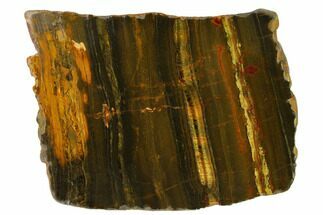This Specimen has been sold.
13.7" Polished Tiger Iron "Stromatolite" Section - 3.02 Ga
This is an absolutely stunning, 13.7" wide section of 3.02 billion year old tiger iron, collected from the Ord Ranges in Western Australia. The face of the specimen has been cut flat and flawlessly polished to a glossy finish. It sits nicely on a flat surface without the need for a display stand.
About Tiger Iron
Tiger Iron is composed mainly of tiger's eye, red jasper, and black hematite in an undulating banded pattern. It is mined primarily in two large deposits, one in South Africa and the other in Western Australia. Both deposits are over 2 billion years old!
Many believe tiger iron should technically be considered a stromatolite formed by ancient cyanobacteria over two billion years ago. One theory holds that tiger iron is a typical stromatolite that has undergone mineral replacement with iron oxide. Another theory suggests that microbes formed the banded iron directly while the stromatolite was being formed.
Even if tiger iron doesn't end up technically being a stromatolite, its formation along with the formation of other Precambrian banded iron formations is indirectly due to the cyanobacteria that formed stromatolites. Oxygen was not present in the early atmosphere, but arose as a byproduct of photosynthesis by cyanobacteria. This oxygen, combined with dissolved iron in Earth's oceans, formed insoluble iron oxides. This precipitated out and formed thin layers on the ocean floor. The bands within the tiger iron could then represent cyclical (seasonal?) variations in oxygen levels within Earth's oceans.
It is assumed that the Earth's first seas were extremely acidic, containing vast amounts of dissolved nickel and iron. As photosynthetic organisms generated oxygen, the available iron in the Earth's oceans precipitated out as iron oxides. At a suspected tipping point the oceans became permanently oxygenated and small variations in oxygen production produced periods of free oxygen in surface waters, alternating with periods of iron oxide deposition.
Tiger iron is gorgeous to look at and even more impressive when you consider its very existence as evidence of life on earth several billion years ago!
Tiger Iron is composed mainly of tiger's eye, red jasper, and black hematite in an undulating banded pattern. It is mined primarily in two large deposits, one in South Africa and the other in Western Australia. Both deposits are over 2 billion years old!
Many believe tiger iron should technically be considered a stromatolite formed by ancient cyanobacteria over two billion years ago. One theory holds that tiger iron is a typical stromatolite that has undergone mineral replacement with iron oxide. Another theory suggests that microbes formed the banded iron directly while the stromatolite was being formed.
Even if tiger iron doesn't end up technically being a stromatolite, its formation along with the formation of other Precambrian banded iron formations is indirectly due to the cyanobacteria that formed stromatolites. Oxygen was not present in the early atmosphere, but arose as a byproduct of photosynthesis by cyanobacteria. This oxygen, combined with dissolved iron in Earth's oceans, formed insoluble iron oxides. This precipitated out and formed thin layers on the ocean floor. The bands within the tiger iron could then represent cyclical (seasonal?) variations in oxygen levels within Earth's oceans.
It is assumed that the Earth's first seas were extremely acidic, containing vast amounts of dissolved nickel and iron. As photosynthetic organisms generated oxygen, the available iron in the Earth's oceans precipitated out as iron oxides. At a suspected tipping point the oceans became permanently oxygenated and small variations in oxygen production produced periods of free oxygen in surface waters, alternating with periods of iron oxide deposition.
Tiger iron is gorgeous to look at and even more impressive when you consider its very existence as evidence of life on earth several billion years ago!
SPECIES
Tiger Iron
LOCATION
Ord Ranges, Western Australia
FORMATION
Cleaverville Formation
SIZE
13.7 x 4.6 x 4.5"
CATEGORY
ITEM
#234606
 Reviews
Reviews














